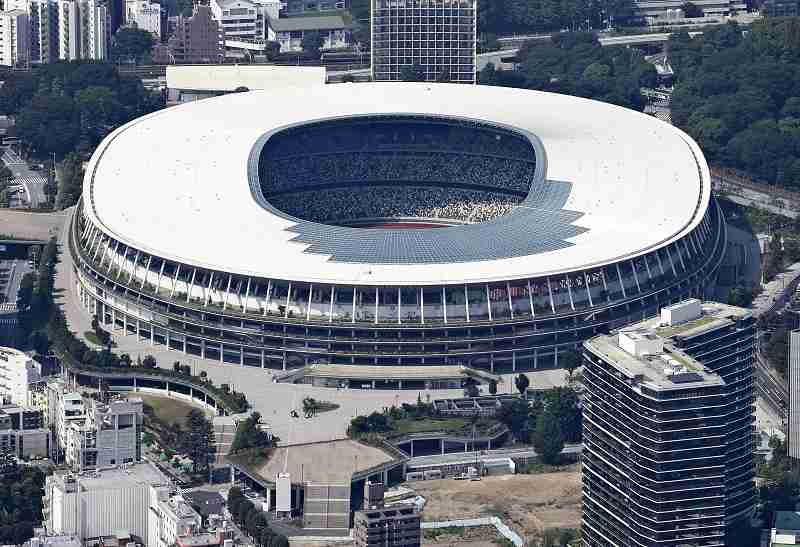Operating rights for National Stadium to be sold to private sector by fiscal 2024

The National Stadium, which was the main venue for the Tokyo Olympics and Paralympics, is seen in July.
7:00 JST, December 29, 2022
The rights to operate the National Stadium for 30 years are to be sold to private entities by fiscal 2024, while the central government intends to cover maintenance and management costs for up to about ¥1 billion a year, the Sports Agency said Wednesday.
The government’s share of the total burden, including land lease fees and repair costs, could exceed ¥3 billion annually.
The stadium in Shinjuku Ward, Tokyo, was newly built to serve as the main venue for the Tokyo Olympic and Paralympic Games last year. Its operations have incurred losses, meaning questions are likely to be raised once again over how to utilize this “legacy” of the Games.
On Wednesday, the agency announced a new plan to realize the privatization of the stadium by the end of fiscal 2024, which had been delayed due to such reasons as the postponement of the Tokyo Games by one year and changes in the economic environment amid the coronavirus pandemic.
Privatization will come two years later than the originally envisioned latter half of 2022, but the new plan maintains the idea of increasing profitability by drawing on the expertise of the private sector. It also specifies that the track-and-field facilities will remain.
The central government will retain ownership of the stadium under the plan and publicly solicit private-sector entities to take charge of operations such as leasing facilities, bringing in events and conducting maintenance and repair work.
The National Stadium was completed in November 2019 at a cost of about ¥156.9 billion. After the lease of the stadium to the Tokyo Games organizing committee ended, regular operations started in April this year, such as renting the stadium for sporting events, concerts and other purposes.
However, expenditures to operate the stadium amounted to about ¥1.84 billion in the budget for the current fiscal year, while its income was about ¥550 million.
The agency intends to boost profitability through such means as selling the stadium’s naming rights, reviewing usage fees and increasing the number of operating days. Public funds of up to ¥1 billion will be used to pay for maintenance and management fees, to encourage the participation of private-sector entities.
If a new operator proposes to cover maintenance and management costs itself, the government’s burden will be reduced. But in reality, it will be a great challenge to make a profit from operating such a huge stadium with a capacity of about 68,000 people.
In addition, the central government has paid about ¥1.12 billion in annual land lease fees to the Tokyo metropolitan government, as well as to Shinjuku and Shibuya wards, since this fiscal year. According to pre-construction estimates, large-scale repair work is expected to cost a total of about ¥65 billion over 50 years, or an annual average of ¥1.3 billion. This cost is expected to be shouldered by the central government.
The agency said that providing a certain amount of public funds would allow private operators to undertake operations with peace of mind, while it hopes that competition will intensify and that the agency will eventually receive proposals that do not involve the use of public money.
The Ariake Arena in Tokyo’s Koto Ward is expected to be the only facility to make a profit among the six facilities that the metropolitan government prepared as venues for the Tokyo Games, as it will be used for events such as concerts by popular singers during the year-end and New Year’s holidays.
The remaining five facilities are difficult to use for purposes other than athletic competitions, so prospects for them to turn a profit are dim. These facilities are projected to incur an annual loss of ¥1.1 billion in total.
Among them, the Tokyo Aquatics Centre is expected to lose ¥640 million a year due to high costs to maintain the water quality of its pool.
Top Articles in Politics
-

Japan PM Takaichi’s Cabinet Resigns en Masse
-

Sanae Takaichi Elected Prime Minister of Japan; Keeps All Cabinet Appointees from Previous Term
-

Japan’s Govt to Submit Road Map for Growth Strategy in March, PM Takaichi to Announce in Upcoming Policy Speech
-

LDP Wins Historic Landslide Victory
-

LDP Wins Landslide Victory, Secures Single-party Majority; Ruling Coalition with JIP Poised to Secure Over 300 seats (UPDATE 1)
JN ACCESS RANKING
-

Producer Behind Pop Group XG Arrested for Cocaine Possession
-

Japan PM Takaichi’s Cabinet Resigns en Masse
-

Japan Institute to Use Domestic Commercial Optical Lattice Clock to Set Japan Standard Time
-

Man Infected with Measles Reportedly Dined at Restaurant in Tokyo Station
-

Israeli Ambassador to Japan Speaks about Japan’s Role in the Reconstruction of Gaza























